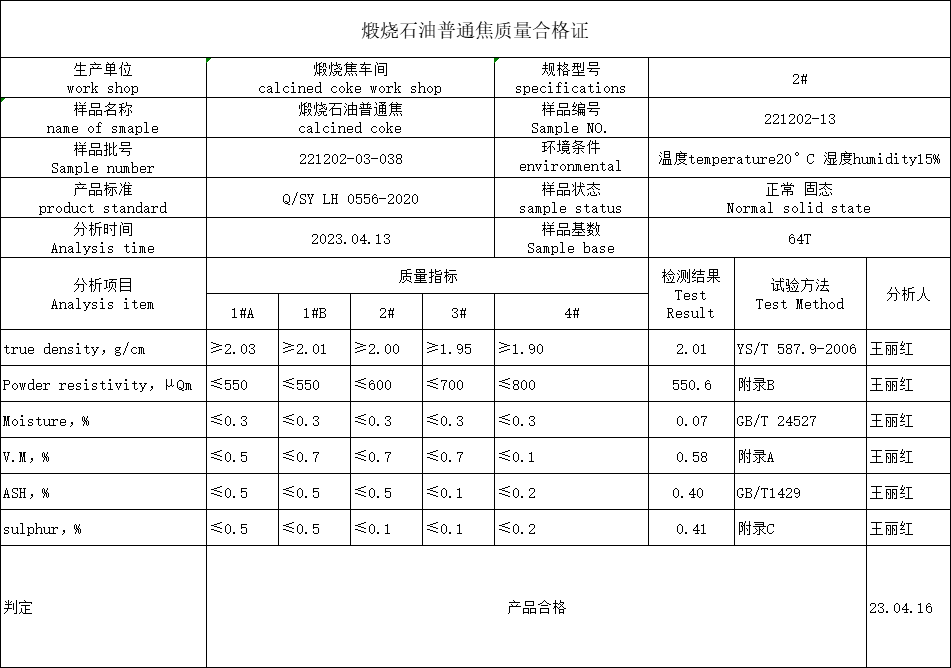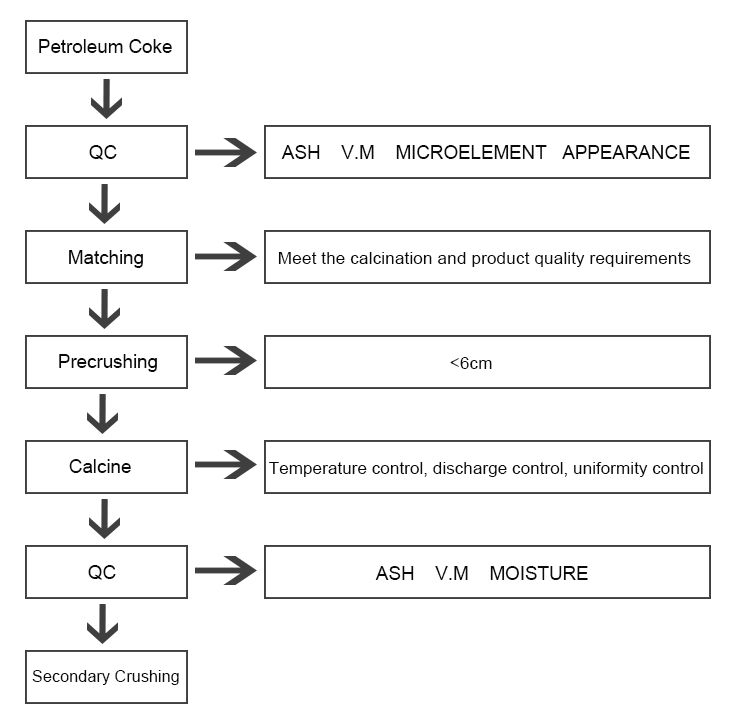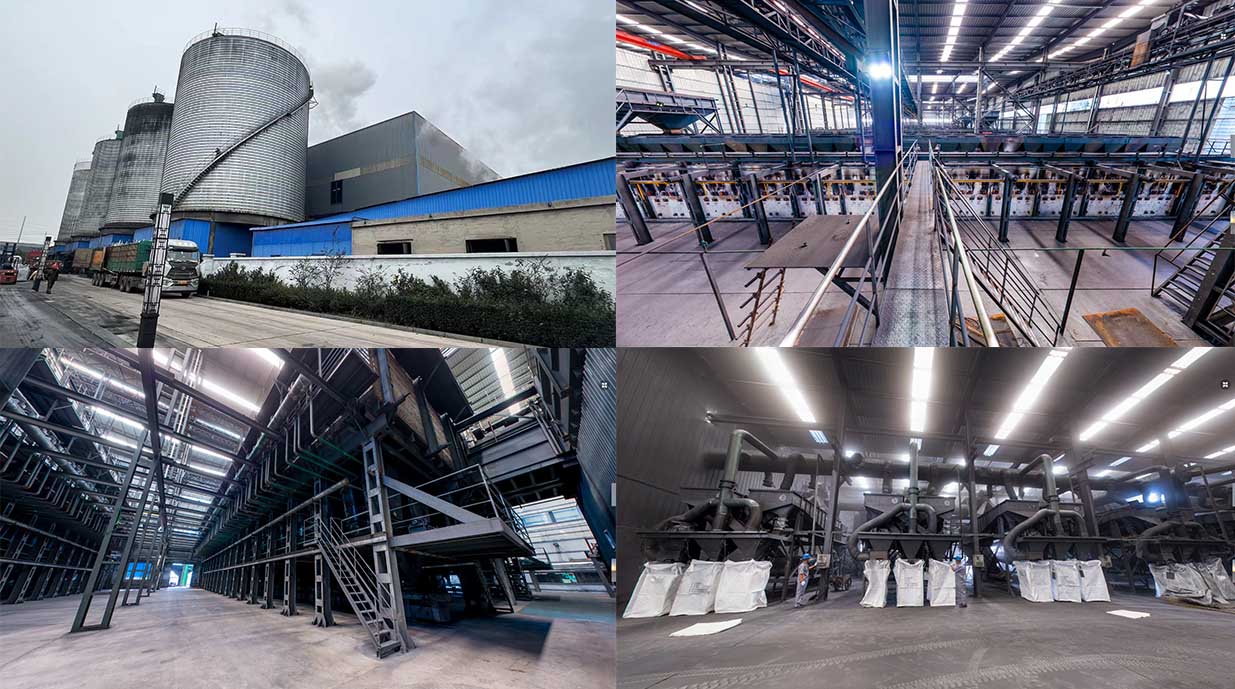Analysis And Suggestion Of Influencing Factors On Quality Of Calcined Coke
Calcined coke plays a crucial role in the production of graphite electrodes, which are essential components used in electric arc furnaces for the production of steel and other metals. The benefits of using calcined coke in the production of graphite electrodes include:
High carbon content: Calcined coke has a high carbon content, typically above 98%. This high purity and carbon content are essential for producing high-quality graphite electrodes that can withstand the extreme temperatures and electrical currents in electric arc furnaces.
Low electrical resistance: Graphite electrodes made from calcined coke have low electrical resistance, allowing them to efficiently conduct the electricity required for the melting and refining of metals in the electric arc furnace. Low electrical resistance ensures better performance and energy efficiency.
High thermal conductivity: Calcined coke-based graphite electrodes have high thermal conductivity, which means they can efficiently transfer heat generated during the electric arc process. This property helps maintain a stable and controlled temperature in the electric arc furnace, leading to consistent metal melting and refining.
Mechanical strength and integrity: Calcined coke provides the necessary mechanical strength to the graphite electrodes, ensuring they can withstand the physical stresses and mechanical forces experienced during electrode handling and insertion into the electric arc furnace.
Low impurity levels: Calcined coke has low impurity levels, which are essential for producing high-quality graphite electrodes. Impurities, such as sulfur, nitrogen, and metals, can adversely affect electrode performance and result in undesirable interactions with the metal being melted.
Resistance to oxidation: Graphite electrodes made from calcined coke have good resistance to oxidation at high temperatures. This property ensures the electrodes have a longer service life and can withstand the harsh conditions of the electric arc furnace.
Consistent quality and properties: Manufacturers of calcined coke maintain strict control over the production process to ensure consistent quality and properties in the resulting graphite electrodes. Consistency is crucial in industrial applications, as it enables predictable and reliable performance during metal production processes.
Recycling and sustainability: Similar to the aluminum production process, the use of calcined coke in graphite electrode production offers recycling opportunities. The carbon content in the coke can be utilized in graphite electrodes, promoting sustainability and reducing waste.
In summary, using calcined coke in the production of graphite electrodes offers numerous benefits, including high carbon content, low electrical resistance, excellent thermal conductivity, mechanical strength, low impurity levels, oxidation resistance, consistent quality, and recycling opportunities. These advantages contribute to the efficiency, reliability, and sustainability of the electric arc furnace process in metal production.
Advantage to using Calcined Petroleum Coke in graphite electrode
Graphite electrodes are essential components in electric arc furnaces used for the production of steel and other metals. CPC plays a vital role in the manufacturing of graphite electrodes due to the following reasons:
Carbon Content: Similar to prebaked anodes, CPC is a crucial source of carbon in graphite electrodes. It provides the necessary carbonaceous material to form the graphite structure. The high carbon content of calcined coke, typically ranging from 98% to 99.5%, ensures that the resulting graphite electrode has excellent electrical conductivity.
Electrical Conductivity: Graphite electrodes need to be highly conductive to facilitate the flow of electrical current in the electric arc furnace. The high carbon content and the specific structure of graphite derived from calcined coke contribute to the excellent electrical conductivity of graphite electrodes. This conductivity allows for efficient and effective heating of the raw materials during the steelmaking process.
Mechanical Strength: Calcined petroleum coke undergoes a calcination process that improves its mechanical strength. This strength is crucial for graphite electrodes as they need to withstand the mechanical stresses and extreme temperature conditions within the electric arc furnace. The mechanical strength of graphite electrodes helps prevent breakage or deformation during operation.
Low Impurity Content: Calcined coke has a significantly reduced level of impurities such as sulfur, volatile matter, and other contaminants. Low impurity content is vital for graphite electrodes as impurities can negatively affect their performance. Impurities can lead to increased electrical resistance, reduced electrical conductivity, and even electrode degradation. Calcined petroleum coke with low impurity levels ensures the production of high-quality graphite electrodes.
Homogeneity and Consistency: Calcined coke provides a homogeneous and consistent carbonaceous material for the manufacturing of graphite electrodes. This uniformity in the properties of CPC contributes to the overall consistency and quality of the resulting graphite electrodes. Consistency is essential to maintain the desired electrical and mechanical properties across the entire electrode, ensuring stable and efficient performance during steelmaking processes.
In summary, calcined petroleum coke serves as a crucial raw material in the production of graphite electrodes. Its high carbon content, excellent electrical conductivity, mechanical strength, low impurity levels, and consistency contribute to the superior performance and durability of graphite electrodes in electric arc furnaces.










